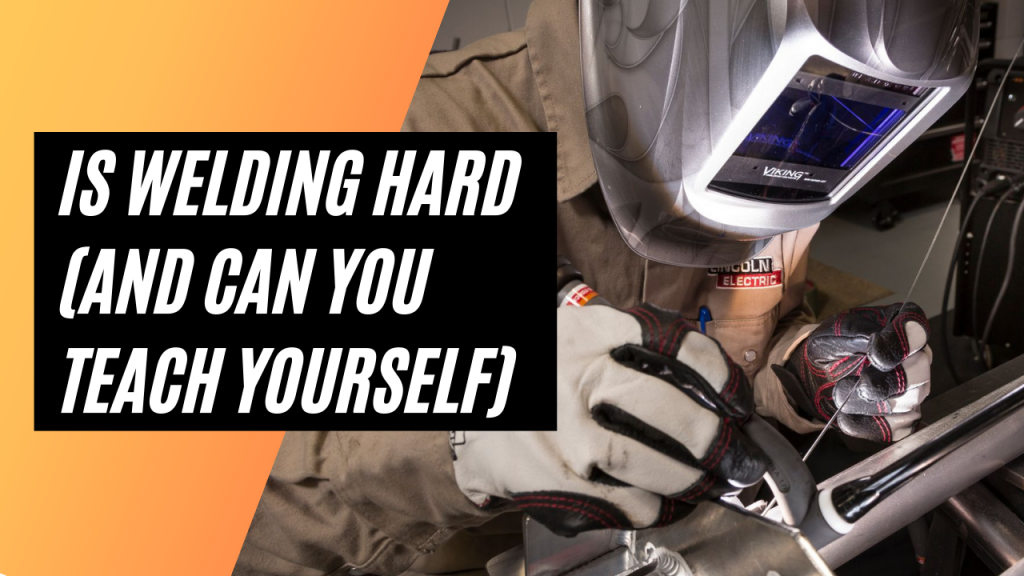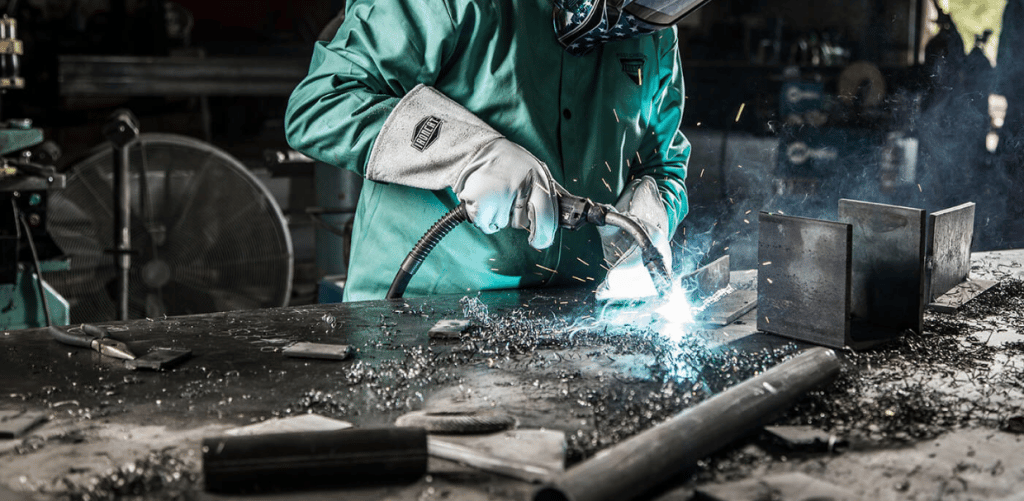Is welding hard? Generally, welding is a difficult skill to learn because it requires a lot of hands-on experience. Additionally, welding takes a lot of practice, along with learning how to do it, for most people, which makes it difficult to actually do.
Do you know how buildings and structures, large and small, stay a whole? Well, that is made possible with welding. Welding is like any other job in that adequacy of expertise must be acquired.
The structure must be erected and remain in one piece, so a good welder is needed. Then is welding a difficult or straightforward job?

150 Cases
Considered
180 Hours of Research
160 Welders
Interviewed
350 Articles
Analyzed
Is Welding a Hard Job?
Welding is a dangerous occupation, and you must know what it is and what types of welding there are. Besides, you should know what skills are required to succeed as a welder.
An Overview of Welding
It is a method of joining two metal pieces together, with other metal bonding methods being less common. However, welding is a preferable method because it is the simplest, the most versatile, and a practical process.
There are two ways of welding, the most common method using heat and the other using pressure. Heat welding involves heating two pieces of metal, so they melt together easily. To bond these metal segments together effectively, the materials must have filler metal in the middle.
Types of Welding
Knowing the different types of welding will make being a welder more appealing to you. In further reading, we will discuss several welding practices you can learn and master to set yourself apart from the competition and make welding an easy job for you.
- Wire Welding: This type of welding is ideal for beginning welding employees who need to weld quickly and at a low cost. Wire welding involves using spools of wire that lead into a welding gun.
Using spools, a continuous process can be accomplished with fewer interruptions, and clean joints can be made.
- Stick Welding: Welding using stick electrodes is mostly used when small repair jobs need to be completed quickly. With this method, welds are produced that require more time than they usually do. This process is commonly used during training and instruction times.
- Tungsten Welding: There are many welding types to choose from, but (TIG) Tungsten welding is probably the most difficult to master. Tungsten welding is commonly used for automotive repairs since it involves joining thin and thick metal materials. TIG is also the only welding process that does not use filler metal.
When tungsten welding is used, which does not use filler metal, the results are cleaner. This is why an experienced professional prefers it over other types of welding.
What Factors Determine The Hardness Of Welding?
Several things are required to learn how to weld appropriately:
1. Knowledge
In addition to understanding introductory chemistry, you’ll need to be proficient with welding, including best practices and tips for success.
2. Time For Practical Application
Regardless of what one’s skill level may be, welding takes years to master. As with anything that requires a lot of learning, welding will take years to learn how to do it correctly and efficiently.
3. Patience
Taking welding lessons isn’t something you can do instantly. Having watched a YouTube video or read a blog post on welding, then immediately doing it could produce serious problems – or a lot of waste. Try to be patient and be okay with failing.
4. An Excellent Teacher
It is even more essential for you to learn welding correctly by taking understudy and practicing under an excellent instructor. Like any trade, you must find a good school and instructor to aid with your education as you learn to weld.
5. Being Smart About Safety
You need to invest time and money in the proper safety equipment for welding, so you don’t get hurt. If you’re not careful and don’t know what you’re doing, welding can be hazardous.
6. Money
A welder can make good money, but you’ll also need to be willing to invest in the right equipment. This means sticking with quality equipment, not settling for cheap machines or accessories, and ensuring that you adhere to safety regulations.
Those are just some of the things that determine how difficult welding can be for you. If you don’t place an adequate amount of focus on those items, it will cause you to experience a much more demanding learning curve.
What Is The Fastest Way To Learn Welding?

Despite how much I would like to say that we can teach you everything you need to know about welding from this website, we simply cannot. We can give you the basics and information you need, but until you master the skills on your own, you will not master them.
Thus, the fastest routes to welding proficiency are:
1. Get A Job As A Welder
You may not be able to get a job as a welder without experience, but you could be an apprentice and gain experience. This is like an internship, so it isn’t as glamorous as it sounds, but it can make a real difference.
Start by checking out two websites to find an apprenticeship:
- The U.S. Department of Labor’s apprenticeship.gov
- A link can be found at careeronestop.org (sponsored by the U.S. Department of Labor).
On both sites, search for “welder” or “welding,” and you will get a list of opportunities. For further information on apprenticeships in your state, a link should be provided to your state’s apprenticeship website.
You can see just like you would on any other job site.
- As soon as the apprenticeship became available
- Where it is located (the city, state, and company)
- What are the minimum requirements needed?
- All relevant contact information
- You may be required to travel if necessary.
- Welder type(s) required (i.e., MIG, TIG, stick, flux-core arc)
So you should be able to apply directly from the site since both have direct application links.
2. Find A Career Path That Allows You To Weld Often
There are several careers for welding that do not require you to be a welder or welder’s apprentice to learn how to weld. According to the advance career Institute . These are the following jobs you can pursue:
- Assemblers and fabricators. This is a great place to learn welding, which you’ll use to finish your electronic or computer projects, but you’ll also learn to weld boats and aircraft.
- Boilermakers. Boilermakers usually travel to work sites (like bridges and mining equipment) to make steel fabrications from things like tubes and plates.
- Jeweler, precious stone, and metal workers. Working differently, you’ll spend most days restoring the original look and feel of precious metals or jewelry pieces.
- Machinists, tools, and die makers. With this career, you’ll typically work with welding machines in the transportation or construction industry (ex. buses, construction tools, automobiles).
- Sheet metal workers. This job involves welding metal sheets to create larger sheets of metal used in other products’ production.
- Plumbers, pipefitters, and steamfitters. Plumbing and pipefitting in residential and commercial buildings might require you to weld less often, but you’ll still need to weld when welding a pipe. It’s essential to ensure accuracy here since you’ll have to make sure the work is up to code.
- Metal and plastic machine workers. You’ll operate the production machines used to make metal and plastic pieces.
Welding may not be your specific career choice, but you’ll learn the trade quickly and become more skilled quickly.
Welding Training
Several trade schools and different types of welding programs offer welding as a series of courses that can prepare you to succeed as a welder. Training is the key to success in the welding profession.
Getting your license and completing these programs is mandatory for becoming a welder.
An employer will always inquire about a license when you pursue a welding career. Furthermore, a license is a token of professional training. Many have gained welding knowledge from a family member or friend. Nevertheless, these base skills must be cemented with a professional course.
Materials for Welding
Welding jobs include a range of different types, and to perform them, you need to have the necessary equipment.
- Metal for Working: A welding process is to weld two pieces of metal together. To do so, you need the metal to be able to do this. In most cases, when working professionally, you can generally get the metal provided for you.
When this happens, you will work with these metal pieces, although sometimes you may have to work with metal that you are provided that is not ideal for the specific project.
- Tools: Different welding tools will provide you with what you need, but you should conduct your research and decide on your needs’ best tool.
- In the beginning, you will need rods, gas shields, a torch, and measurement tools. You will also find it very helpful to have hammers, saws, and clamps.
- Materials for Protection: It is an easy job, but there are still plenty of precautions that should be taken. One of them is making sure to have all the protective gear you need, including shields, gloves, overalls, and protective shoes while you are on the job.
The arcing of metal emitted during welding creates intense heat, so all of the items on the list need to protect you from that.
Welding Safety
Welding needs high-intensity heat, so you must follow all safety procedures. The first stage is to make certain that you are shielding yourself. You should wear the protective gear mentioned previously on a job site or even at home.
You need to follow shop safety rules if you own a workshop at your home. This includes ensuring that all the tools you used are stored away after use and maintained well.
Old, dirty, and rusted tools may pose a risk to the worker. Each tool must have a good home and be returned to it after use.
Welding as a Great Job
You have a lot of choices since you have gained your license. There is a mass of fields that need welders, and it just depends on which one you choose to go into. For example, you can go into education, underwater welding, robotics, and engineering.
Almost every town, city, state, and country offers welding jobs. Every day, infrastructure is being built, making welding a challenging profession.
Working hands-on is another great benefit, as some people decide not to sit at a desk every day for hours on end. When you are a welder, you are outdoor, at different working sites.
Because of the demand for welders, you will never have to work in one place for an extended period. And you can change your surroundings whenever you see fit because there is such a high demand for them.